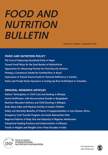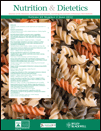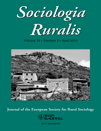
Food Culture & Society
Scope & Guideline
Connecting Food Systems with Social Inquiry
Introduction
Aims and Scopes
- Cultural Analysis of Food Practices:
The journal emphasizes the examination of food as a cultural artifact, highlighting how culinary traditions, practices, and narratives influence and reflect societal values and identities. - Interdisciplinary Approaches:
Research published in this journal employs diverse methodologies from anthropology, sociology, history, and cultural studies, allowing for a multifaceted exploration of food systems and cultures. - Food Sovereignty and Security:
A core area of focus is the discourse around food sovereignty, food justice, and security, particularly in relation to marginalized communities and the impact of global food systems on local practices. - Food and Identity:
The journal explores the intersections of food with identity, including ethnic, gender, and class identities, and how these intersections influence consumption patterns and culinary expressions. - Impact of Globalization on Local Food Cultures:
Scholarly contributions examine the effects of globalization on local food practices, including the commodification of traditional cuisines and the emergence of fusion foods. - Food Politics and Ethics:
The journal critically analyzes the political dimensions of food, including regulatory practices, ethical consumption, and the implications of food production methods on health and the environment.
Trending and Emerging
- Food Activism and Social Movements:
A surge in studies focusing on food activism, including grassroots movements advocating for food justice, sustainability, and community resilience, has emerged, reflecting a growing interest in the role of food in social change. - Digital Food Cultures:
The exploration of food within digital contexts, including social media's impact on culinary practices and food marketing, has gained traction, showcasing how technology influences contemporary food culture. - Intersectionality in Food Studies:
Research that examines the intersections of race, gender, sexuality, and class in food practices is increasingly prevalent, emphasizing the complexities of identity and power within culinary contexts. - Climate Change and Food Systems:
There is a notable increase in research addressing the impacts of climate change on food systems, including sustainability practices and the adaptation of food cultures in response to environmental challenges. - Health and Food Justice:
Emerging discussions around the connections between health, nutrition, and food justice highlight the importance of equitable access to healthy food, particularly in marginalized communities.
Declining or Waning
- Traditional Gastronomy:
There has been a noticeable decline in research dedicated solely to traditional gastronomy without a critical lens, as contemporary studies increasingly seek to contextualize food within broader socio-political frameworks. - Nostalgia in Food Narratives:
Themes centered on nostalgia and heritage foods appear to be less prevalent, possibly due to a growing emphasis on the present and future implications of food practices rather than romanticizing the past. - Simple Culinary Techniques:
Research purely focused on basic culinary techniques, recipes, or cooking methods without connecting them to larger cultural or social issues is becoming less common, as the journal shifts towards more analytical and critical perspectives. - Regional Food Studies:
While regional studies have historically been a key focus, there is a trend towards global comparisons and transnational analyses, leading to a decrease in localized food studies that do not engage with broader themes. - Food and Consumer Behavior:
The examination of food solely through consumer behavior metrics, without incorporating cultural or ethical dimensions, has decreased, as the journal seeks to integrate more holistic and critical approaches.
Similar Journals

FOOD AND NUTRITION BULLETIN
Connecting Science with Culinary ExpertiseFOOD AND NUTRITION BULLETIN, published by SAGE Publications Inc, is an influential academic journal dedicated to advancing research in the fields of food science, nutrition, and dietetics. With an established history since 1982, this periodical has become a vital resource for researchers, practitioners, and students seeking to understand the complexities of food and nutrition within various contexts. Holding a commendable impact factor and categorized within the prestigious Q2 and Q1 quartiles across multiple relevant fields, it boasts significant rankings in Scopus, including the 73rd percentile in Geography, Planning and Development. The journal fosters scholarly discourse and innovation by disseminating the latest findings, reviews, and theoretical discussions aimed at improving public health and nutrition policy. By focusing on evidence-based research and interdisciplinary perspectives, the FOOD AND NUTRITION BULLETIN plays a crucial role in shaping future research and practice in the ever-evolving landscape of food and nutrition.

Nutrition & Dietetics
Transforming Dietary Knowledge into ActionNutrition & Dietetics is a premier peer-reviewed journal published by WILEY that serves as a key resource for researchers, professionals, and students in the fields of nutrition, dietetics, and public health. With its ISSN 1446-6368 and E-ISSN 1747-0080, the journal focuses on disseminating high-quality research that addresses contemporary issues in food science, dietary practices, and nutritional health. Ranked in the Q2 category in both Nutrition and Dietetics and Public Health for the year 2023, it enjoys an impressive standing within its scientific community, reflected in Scopus ranks placing it in the top percentile of its categories. Although not an Open Access journal, readers can access a wealth of knowledge from studies converging from 2006 to 2024. The journal's commitment to advancing evidence-based practices makes it indispensable for those engaged in bridging the gap between nutrition science and practical application, while it continues to evolve alongside emerging research and global health trends.

JOURNAL OF AGRICULTURAL & ENVIRONMENTAL ETHICS
Advancing Ethical Discourse in Agricultural PracticesJOURNAL OF AGRICULTURAL & ENVIRONMENTAL ETHICS, published by SPRINGER, is a leading interdisciplinary journal dedicated to exploring the complex relationships between agriculture, the environment, and ethical considerations. With an ISSN of 1187-7863 and an E-ISSN of 1573-322X, this journal holds a prestigious position in various categories, achieving Q1 rankings in Agricultural and Biological Sciences and History, demonstrating its influence with a Scopus rank of 17th out of 1760 in the domain of Arts and Humanities. The journal aims to provide a comprehensive platform for scholars and practitioners to engage in critical discussions surrounding ethical frameworks affecting agricultural practices and environmental stewardship. Offering a publication window from 1991 to 2024, the journal contributes significantly to both theoretical and practical advances in its field, facilitating access to essential insights that benefit researchers, professionals, and students alike. Situated in the Netherlands, the journal adheres to high academic standards while addressing pertinent global issues.

Future Foods
Pioneering research for a secure food future.Welcome to Future Foods, a cutting-edge academic journal published by Elsevier, dedicated to advancing the field of food science. As a prestigious Q1 journal in the Food Science category, it ranks impressively as #43 out of 389 in Scopus, placing it in the 89th percentile among its peers. Future Foods aims to explore innovative developments in sustainable food systems, novel food products, and the intersection of technology and food production, thus providing a platform for research that addresses global challenges such as food security and nutrition. With its focus on future-oriented solutions and trends in the food industry, this journal is essential for researchers, professionals, and students who are eager to contribute to the discourse around cutting-edge food science. Situated in the Netherlands, the journal serves the international academic community and fosters collaboration and knowledge sharing in the realm of food innovation.

British Food Journal
Pioneering Research for a Sustainable Food FutureBritish Food Journal, published by Emerald Group Publishing Ltd, is a leading academic journal that has been at the forefront of food research since its inception in 1899. With a robust reputation reflected in its prestigious Q1 category rankings in both Business, Management and Accounting and Food Science, this journal is particularly esteemed for disseminating impactful studies that influence the future of food-related industries. Scholars and practitioners benefit from high-quality research that explores the nexus of food innovation, consumer behavior, and sustainable practices. The journal's contributions are recognized on a global scale, with notable rankings in Scopus indicating its significant influence, including a rank of #24/189 in Business, Management and Accounting and #75/389 in Food Science. Aimed at fostering collaboration across disciplines, British Food Journal remains an essential resource for anyone passionate about food science and its implications on health, economy, and culture. Access to this journal's rich archive and contemporary articles continues to inspire and inform researchers, professionals, and students alike.

Current Research in Nutrition and Food Science
Transforming research into impactful solutions.Current Research in Nutrition and Food Science is a premier academic journal dedicated to advancing knowledge in the fields of nutrition and food science. Published by ENVIRO RESEARCH PUBLISHERS, this journal serves as a critical platform for researchers, professionals, and students to disseminate impactful research findings. With its Q3 ranking in both Food Science and Medicine (miscellaneous) categories for 2023, it reflects its commitment to quality and relevance within these disciplines. The journal operates under an open access model, ensuring that its content is readily available to a global audience, thus promoting collaboration and innovation across various sectors. Covering a wide range of topics from agricultural practices to the biochemical aspects of nutrition, Current Research in Nutrition and Food Science invites contributions that push the boundaries of understanding, addressing contemporary challenges in food safety, dietary health, and nutrition policies. As it continues its journey from 2013 to 2024 and beyond, the journal occupies an essential role in fostering a dialogue among scholars and practitioners, supporting the advancement of science and, ultimately, healthier global communities.

ITALIAN JOURNAL OF FOOD SCIENCE
Pioneering Insights in the Culinary WorldITALIAN JOURNAL OF FOOD SCIENCE is a distinguished open-access publication dedicated to advancing knowledge in the field of food science, catering to a global audience of researchers, professionals, and students. Published by Codon Publications in Singapore, this journal, operating under the ISSN 1120-1770 and E-ISSN 2239-5687, has been a vital platform for scholarly discourse since its inception in 1996, converging towards a comprehensive view of food science trends through 2024. With an impressive ranking in the third quartile (Q3) of the Food Science category and a Scopus rank of #151 out of 389, the journal plays a significant role in disseminating high-quality research, contributing to a richer understanding of food science within the agricultural and biological sciences. Since transitioning to open access in 2008, it has further expanded its reach, ensuring that innovative research is accessible to all, thereby fostering collaboration and knowledge exchange in this vital industry.

eFood
Pioneering insights in food technology and nutrition.eFood is a pioneering journal in the field of food science, published by the esteemed WILEY. With its impactful emergence, the journal has rapidly established itself within the academic community, evidenced by its impressive Q1 category ranking in Food Science as of 2023, and a commendable position at Rank #95 out of 389 in the Scopus database. Covering a wide spectrum of topics related to food innovation, technology, safety, and nutrition, eFood serves as an indispensable platform for researchers, industry professionals, and students who are at the forefront of advancing our understanding of food systems. The journal notably operates with an open-access model, promoting wide dissemination of knowledge while enhancing the visibility of high-quality research. As we look forward to converging years from 2020 to 2024, eFood is poised to foster rigorous scientific discourse and contribute significantly to the future of food science research.

International Journal of Gastronomy and Food Science
Innovating Culinary Studies with Rigorous Scientific DiscourseThe International Journal of Gastronomy and Food Science, published by ELSEVIER, serves as a premier platform for scholars and practitioners in the domains of gastronomy and food science. With an ISSN of 1878-450X and E-ISSN 1878-4518, this journal has been recognized for its impact, holding a prestigious Q1 ranking in Cultural Studies and a Q2 ranking in Food Science as of 2023, thereby reflecting its influence and relevance in the field. It is particularly noted for its robust Scopus rankings, placing 28th out of 1304 in Social Sciences - Cultural Studies, advocating for high-quality research with a 97th percentile ranking, and 117th in Agricultural and Biological Sciences – Food Science with a 70th percentile ranking. This open-access journal offers a comprehensive exploration of food-related issues, aiming to bridge the gap between culinary arts and scientific research, enhancing the understanding of food systems and cultural significance. For researchers, professionals, and students alike, the International Journal of Gastronomy and Food Science is an invaluable resource, dedicated to fostering innovation and comprehensive discourse in culinary studies.

SOCIOLOGIA RURALIS
Connecting Rural and Urban NarrativesSOCIOLOGIA RURALIS, published by Wiley, stands as a leading academic journal in the field of sociology and political science, boasting an impressive Q1 classification in the 2023 category quartiles. With an ISSN of 0038-0199 and E-ISSN 1467-9523, this journal has been a cornerstone of rural sociological research since its inception in 1960. SOCIOLOGIA RURALIS aims to explore the complexities of rural communities, the dynamics of rural-urban interactions, and the sociopolitical structures that influence rural life. Its esteemed standing is reflected in its Scopus rank of 77 out of 1466, placing it in the 94th percentile of social sciences journals. Although currently not an open-access publication, the journal provides critical insights that significantly advance the understanding of rural issues, making it an essential resource for researchers, practitioners, and students dedicated to the field.